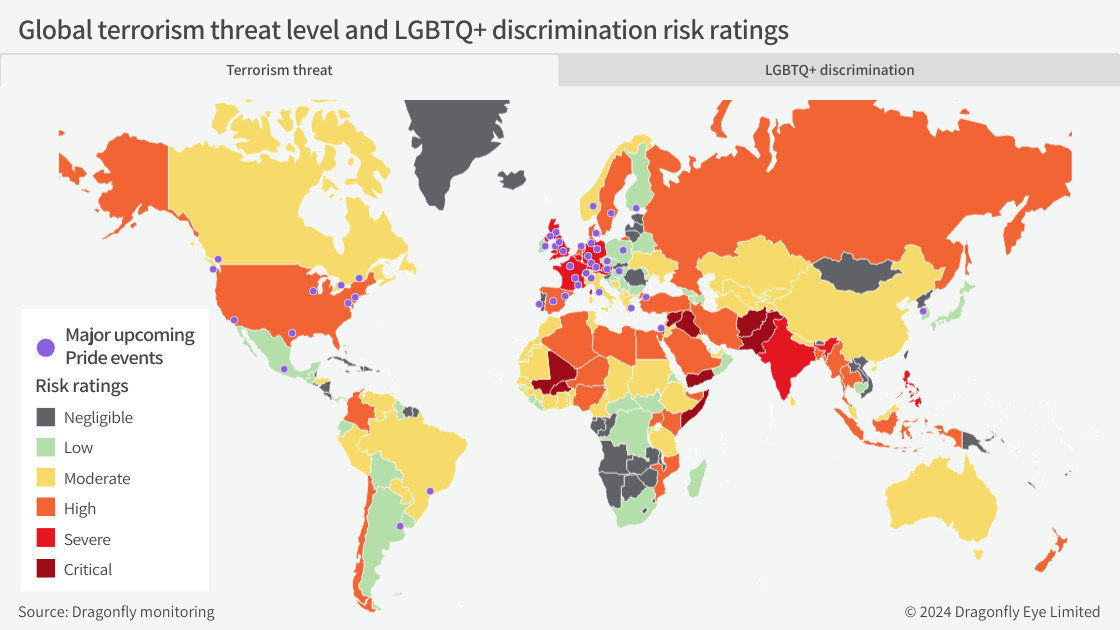Three US government agencies have issued warnings about the potential for violence against LGBTQ+ individuals and events
This assessment was issued to clients of Dragonfly’s Security Intelligence & Analysis Service (SIAS) on 31 May 2024.
- Any attacks by Islamists or far-right extremists in Western countries would probably be crude and target Pride festivities or LGBTQ+ individuals
- Sporadic protest-related violence is also probable, particularly in Eastern Europe and nearby countries
The US authorities appear concerned about threats to LGBTQ+ individuals and events during Pride over the coming months. Three US government agencies issued warnings in May about the potential for violence during Pride worldwide. The messages are largely precautionary, in our analysis, and reflect what the US assesses to be a heightened intent among jihadists to mount attacks in Western countries due to the war in Gaza. Based on incidents during Pride in recent years, we assess that right-wing extremists (particularly in the US, and in central and eastern Europe) will also be motivated to disrupt upcoming LGBTQ+ events over the coming months.
We agree that jihadists are particularly intent on mounting attacks in Western countries at present, regardless of Pride month. But we have seen little to suggest that they are capable of carrying out anything more than crude, isolated acts of violence. And the security forces in these countries have disrupted the small number of jihadist plots there have been to target Pride events in recent years.
We still assess that most festivities will pass off peacefully this year; any attacks would probably involve attempted stabbings or vehicle rammings. Any actions by right-wing extremists would be likely to be counter-protests or isolated incidents of physical or verbal harassment.
Recent messages are largely precautionary
The US assesses that jihadists pose the primary threat to upcoming events, in our analysis of the recent warnings. None names specific groups. Both a worldwide security alert from the State Department on 17 May and a combined FBI-Department of Homeland Security (DHS) public service announcement on 10 May mention ‘foreign terrorist organisations (FTOs)’. US agencies have commonly used ‘FTOs’ when referring to global jihadist groups, such as Al-Qaeda, in recent years. The FBI-DHS alert also only references attacks and messaging by Islamic State (IS) in its message.
The recent warnings also seem to be precautionary; neither cites any new or specific threats against upcoming events. The most recent propaganda the FBI-DHS alert cites was from 2023, involving English-language IS messaging that featured anti-LGBTQ+ rhetoric. This is largely consistent with our monitoring of jihadist online propaganda in recent months; users on IS online channels have issued multiple calls for attacks in Europe and the US during the period. While some have included anti-LGBTQ+ rhetoric, this has mostly been generic. We have not seen any specific calls to target Pride events.
We suspect that the US issued its recent messages partly because large upcoming Pride events will provide an appealing target for jihadists. This is largely due to their existing intent to mount attacks in Western countries over their perceived support for Israeli military operations in Gaza. As the FBI-DHS message notes, ‘FTO efforts to commit or inspire violence against holiday celebrations, including Pride celebrations or LGBTQ+-related venues, are compounded by the current heightened threat environment in the United States and other Western countries’.
Neither of the recent warnings specifies where the US assesses the threat to upcoming Pride events and LGBTQ+ individuals is particularly pronounced. We assess attacks would be most likely in major cities in Austria, Belgium, France, Germany, as well as the US and UK. This is based on our terrorism threat levels, our monitoring of extremist online propaganda, incidents in recent years, as well as places where large festivities are planned over the coming months.
The map shows our country terrorism threat and LGBTQ+ discrimination risk levels, as well as the plans for Pride events worldwide over the coming months that we have seen. Click on the dots for the details of events in specific cities. We will also publish these on our Flashpoints Calendar.

While unlikely, we assess that any terrorist attacks at upcoming Pride events would probably be crude, involving a lone actor or a small number of assailants. Despite signs that jihadists have long been intent on targeting LGBTQ+ individuals and crowded areas in Western cities, high-impact attacks have been rare in recent years. This has remained the case since the beginning of the Israel-Hamas conflict in October 2023; since then, there have been eight jihadist attacks in Europe and North America, according to our data. None of these attacks has caused more than a small number of casualties.
Threat from right-wing extremists
In addition to jihadists, we assess that people who espouse extreme right-wing views will also try to target upcoming Pride events. Neither the US nor other security officials have issued any public warnings about the threat from these extremists, as far as we have seen. But anti-LGBTQ+ individuals have attempted to disrupt Pride events in Georgia, Hungary, Poland, Romania, Serbia, Turkiye and the US in recent years. Given the established hostility to Pride and LGBTQ+ individuals among groups in these countries, we anticipate similar efforts this year.
Based on incidents in recent years, we assess that any right-wing extremists are more likely to try to disrupt Pride events this year than mount attacks. Anti-LGBTQ+ activists have held counter-Pride protests in Georgia, Hungary, Poland, Romania, Serbia and Turkiye in recent years. There were small counter-protests at a Pride march in Jerusalem on 30 May. In the US, right-wing individuals also disrupted multiple Drag Queen Story Hours last year.
In any case, major violence at Pride events by right-wing extremists is unlikely. The counter-rallies that have occurred in recent years were often well-policed and away from the main Pride events, which is highly likely to remain the case over the coming months. Any incidents would most likely consist of sporadic scuffles or verbal and physical harassment of LGBTQ+ individuals.
Image: Pride march starts at Port d’Aix square in Marseille, France, on 30 September 2023. Photo by Sener Yilmaz Aslan/Getty Images.




